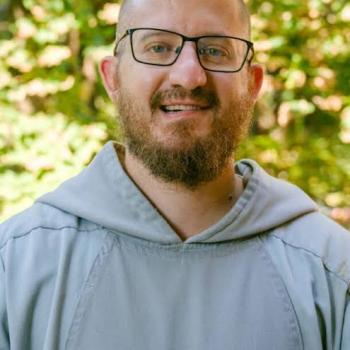
God can and does work in mysterious ways; this is because God is so great, so marvelous, so transcendent to us, that we will never fully comprehend God or what God does. This is not because God acts without reason. God does not act sub-rationally. Rather, we must realize the limits of human reason and understanding. The greatness of God and God’s reasoning transcends what we are capable of understanding. We can apprehend what God deigns to reveal to us through revelation, but even then, that revelation is linked to and contains truths which transcend human reason, truths which transcend our expectation. We must be willing to let God direct us and guide us; if we are open to God, if we are open to the promptings of providence, we will be able to find ourselves doing and learning things which we would otherwise not have done, indeed, things which would lay way beyond what we could have imagined we would be doing.
The Holy Family, Joseph, Mary, and whatever children Joseph might have had from a former spouse, learned this the hard way. For them, revelation came with trials and tribulations. Joseph constantly found himself being told new and marvelous things. Every time, he found himself faced with a new trial, from having to accept Mary’s pregnancy, to having to take his family out of Israel and into Egypt:
Now when they had departed, behold, an angel of the Lord appeared to Joseph in a dream and said, “Rise, take the child and his mother, and flee to Egypt, and remain there till I tell you; for Herod is about to search for the child, to destroy him.” And he rose and took the child and his mother by night, and departed to Egypt, and remained there until the death of Herod. This was to fulfil what the Lord had spoken by the prophet, “Out of Egypt have I called my son” (Matt. 2:13-15 RSV).
It would not have been easy for the Holy Family to make it to Egypt. And, according to Coptic tradition, it was not easy for them when they arrived to Egypt, for they were not always welcomed by either the people or the authorities of Egypt. They were constantly on the move, going from place to place, sometimes finding welcome, sometimes being chased away. God had told them it was where they were to go for safety, and it was safe, in comparison to what they would have faced if they had stayed in their homeland. But it was not entirely safe. They felt and experienced what so many immigrants (documented or undocumented) experience when they flee to a new land. They found some who welcomed them, but many others who treated them as unwelcome foreigners. They had to accept that God’s plan was to be fulfilled in this manner, though it must have left many questions as to why it had to be this way. This is what revelation does; it teaches and guides and directs, but that doesn’t mean it leaves us without question. We will apprehend some of it, but much of it will be beyond us; we must not let our doubts and confusion overcome what we truly have come to know thanks to the providence of God.
Those who open themselves up to God, those who are willing to take what they learn from God and follow it, no matter the difficulty they find, find their lives changed, so that, like Paul, what they know and learn transcends what they could have learned from others. This is proof we have that God was at work in their lives:
For I would have you know, brethren, that the gospel which was preached by me is not man’s gospel. For I did not receive it from man, nor was I taught it, but it came through a revelation of Jesus Christ. For you have heard of my former life in Judaism, how I persecuted the church of God violently and tried to destroy it; and I advanced in Judaism beyond many of my own age among my people, so extremely zealous was I for the traditions of my fathers. But when he who had set me apart before I was born, and had called me through his grace, was pleased to reveal his Son to me, in order that I might preach him among the Gentiles, I did not confer with flesh and blood, nor did I go up to Jerusalem to those who were apostles before me, but I went away into Arabia; and again I returned to Damascus (Gal. 1:11-17 RSV).
It is not that Paul would have us abandon our relationship with others, with those who have their own charism from God. Paul had his charism affirmed by Cephas (Peter) and James, the Lord’s brother: “Then after three years I went up to Jerusalem to visit Cephas, and remained with him fifteen days. But I saw none of the other apostles except James the Lord’s brother” (Gal. 1:18-19 RSV). The special nature of Paul’s charism, the special revelation which he received, is beyond what most of us will experience, but all of us have a part of us touched by God, where God is directing us, exhorting us, encouraging us to act without having to rely upon others to act. God is teaching each of us in ways which others are not taught, and in ways which transcend what can be taught. We must make sure of what we believe to be from God, is from God; we must make sure we are not deluded, that we are not confusing our own thoughts and desires as being directly given to us from God, so like Paul, we must always make sure we heed those who have authority to make such decisions. We must die to the self; we must be humble in our service to God, otherwise, even if what we have been given is from God, we will misconstrue it and pervert it, turning it against the good which God would have us do. We would lead ourselves astray as we rely upon ourselves, confusing such reliance as relying upon God. Paul, who had received special revelation, still had to have it confirmed, and so we, likewise, must allow ourselves to be tested, and humbly submit to the result of such testing.
Revelation transcends our comprehension, but even what we can apprehend will leave us with questions. Why does God have us act in certain ways instead of others? Why does God act in certain ways and not others? If we get lost in these questions, we lose sight of what we have learned and the good which we can receive from it. We must be willing to open our hearts to God and listen in silence, that is, without question, and act in unison with what we have learned. We must try to overcome ourselves, our questioning, our attempts to seize the truth for ourselves. We not realize its transcendence means we will not comprehend it. We must be willing to listen to God, the truth of God, beyond all other representations of the truth. This is not to say we must avoid trying to understand what we have received. God wants us to do that, too, but we must be willing to accept our own limitations. Likewise, we must not abandon our relationship with others. When we follow God, we must make sure we are not deceived. We must make sure our calling is true. That doesn’t mean we go searching for what others have said and try to make what they have to say conform to what we have received, for that will not allow us to be tested; rather, it means speaking what we know, doing what we find is right, and then let it be judged by those who have authority, those who have charism of their own.[1] If they judge us to be mistaken or in error, we must accept that judgment in all humility, and discern where they problem lies (it can be that we are mistaken about being given some sort of revelation or direction from God, or it can be we are mistaken, at least partially, in our understanding of that revelation); but if they judge we stand with the truth, we can and should continue, in all humility, doing what we know to do, until we find ourselves called in another direction, whereby we must then once again allow ourselves to be tested and see if that new direction, likewise runs true with God’s providence.
[1] Obviously, not everyone who claims it, has it, or even if some have it, they do not have it over us. Thus, Paul did not meet with all of the apostles, but with Peter and James alone.
Stay in touch! Like A Little Bit of Nothing on Facebook.
If you liked what you read, please consider sharing it with your friends and family!
















